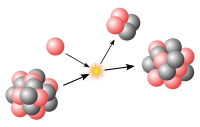This article needs additional citations for verification. (July 2016) |
| Nuclear physics |
|---|
 |
In nuclear physics, properties of a nucleus depend on evenness or oddness of its atomic number (proton number) Z, neutron number N and, consequently, of their sum, the mass number A. Most importantly, oddness of both Z and N tends to lower the nuclear binding energy, making odd nuclei generally less stable. This effect is not only experimentally observed, but is included in the semi-empirical mass formula and explained by some other nuclear models, such as the nuclear shell model. This difference of nuclear binding energy between neighbouring nuclei, especially of odd-A isobars, has important consequences for beta decay.
The nuclear spin is zero for even-Z, even-N nuclei, integer for all even-A nuclei, and odd half-integer for all odd-A nuclei.
| Even | Odd | Total | |
|---|---|---|---|
| Stable | 150 | 101 | 251 |
| Long-lived | 26 | 9 | 35 |
| All primordial | 176 | 110 | 286 |
The neutron–proton ratio is not the only factor affecting nuclear stability. Adding neutrons to isotopes can vary their nuclear spins and nuclear shapes, causing differences in neutron capture cross sections and gamma spectroscopy and nuclear magnetic resonance properties. If too many or too few neutrons are present with regard to the nuclear binding energy optimum, the nucleus becomes unstable and subject to certain types of nuclear decay. Unstable nuclides with a nonoptimal number of neutrons or protons decay by beta decay (including positron decay), electron capture, or other means, such as spontaneous fission and cluster decay.
